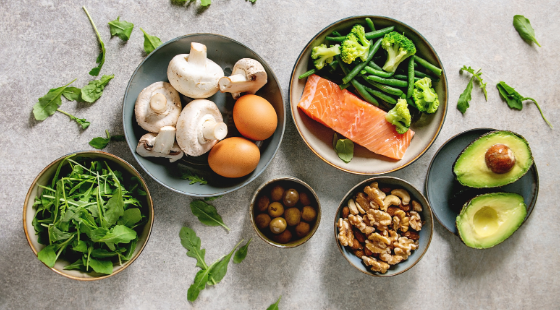
The Ketogenic Diet: How To Get Started And Avoid Common Mistakes

The ketogenic diet has become popular among fad dieters in recent years. In reality, the ketogenic diet is a very specific dietary protocol that is easy to apply incorrectly. Because it requires specific macronutrient ratios and specific healthy fats, there are lots of individuals doing “keto” the “wrong way”.
Because the ketogenic diet is very specific, if you do not adhere to the strict ratios or consume the right types food, then your ability to get into or remain in ketosis will be difficult. To be successful with a ketogenic diet you must be consuming 75% fat, 20% protein and 5% carbohydrates.
Below we cover some common mistakes individuals make when undertaking a ketogenic diet, as well as some tips to ensure you avoid these pitfalls so you’re experience with the ketogenic diet can be a successful as possible.
Common Mistakes
Consuming Too Much Dairy
A common mistake people make is consuming high amounts of dairy products. Although dairy is high in fat, it is also high in the milk sugar lactose (which is a carbohydrate). Dairy can also be inflammatory to the body, so dairy should be consumed in moderation
Not Eating Enough Vegetables
Because the ketogenic diet eliminates all grains, starchy vegetables and almost all fruits, it is easy to establish eating habits that do not provide enough variety in the diet. An individual may be so focused on consuming enough fat that they forget about all the vegetables! Consumption of non-starchy vegetables is crucial because a high meat diet such as keto can be very acidic to the body. High acidity can lead to fatigue, gut issues, and headaches, but to name a few. While on the keto diet you must be consuming a lot of darky green leafy vegetables, broccoli, cauliflower, Brussel sprouts, asparagus and other low-starch vegetables in order to off-set the acidity of the animal products.
Not Staying Hydrated
Because of the metabolic process of burning ketones and getting into ketosis you are required to drink a lot of water, which often people do not do. When first starting keto the body starts using up all its glucose storage, which is stored in the form of glycogen. Glucose holds onto water so when glycogen is broken down the body releases water, which is why you will find yourself frequenting the washroom in the first 2 weeks and this can often lead you to being dehydrated.
Not Consuming Enough Variety of Fats
On the ketogenic diet it’s important to consume a variety of good fats from sources such as avocado, olives, free range eggs, nuts, olives oil, oily fish, grass fed beef, and coconut oil. It is easy to revert to bacon, processed deli meats, soft cheeses, which are highly processed and contain additives and preservatives that can in fact be detrimental to your health if consumed in large amounts.
Over-consuming Protein
By trying to consume enough fats often individuals over-consume protein in the forms of meats, which results in the consumption of too much protein (>30% intake). When consuming high amounts of protein your body can actually break this down and convert this to glucose which will result in kick you out” of ketosis.
Not Planning Ahead
Going out for the day without preparing what you will eat, or knowing keto friendly options while out, can be a recipe for disaster.
Helpful Tips To Be Successful with the Ketogenic Diet
Prepare Before You Start
You are going to need time to throw out or use up foods in your house that are not “keto friendly”. Keeping these foods in a cupboard or pantry can lead to temptation, especially when you are transitioning into ketosis and your cravings for carbs will be high. So, take time to get rid of the foods that will not serve your goal and replace them with high quality keto-friendly foods.
Meal planning for the week
It can be quite an adjustment to prepare different meals and recipes that you may not be familiar with. Putting together a meal plan in advance so you don’t feel stuck is a great strategy to support your success.
Get educated
The ketogenic diet doesn’t have to be complicated, but it is important to educate yourself properly on the pros and cons of the diet, what foods you should be consuming, and what you need to be avoiding. It might be necessary, especially if you have health issues, to recruit a health professional such as a nutritionist or dietitian to help you navigate the process and ensure your success with the diet.
Recruit Support
Change is always a challenge. It will be even more difficult to be successful on a ketogenic diet if your whole household is still loading up on potatoes, pasta and pizza while you are munching on boiled eggs and guacamole. If recruiting them into the diet is not possible, then creating meals that serve the whole family can still an option! For example, you might make a Greek chicken salad, but serve it with roasted potatoes on the side for the rest of the family. Again, you might find if more stress-free to have a health professional l(ink) assist you with the menu planning to take the stress out of meal times.
Managing the “Keto Flu”
While your body is moving from a carb-burner to a keto-burner, you are going to experience various symptoms as you progress through that transition and your body learns to adapt by making more fat enzymes, readjusting hormones, and so on. You can also experience the “keto flu” as a result of stress, imbalance of vitamins and minerals, dehydration or deficiency in eletcrolytes. If you are someone that has relied heavily on carbs then you are likely to experience more significant symptoms. The “keto flu” usually sets in between day 3 and 7 and ends between day 5 and 14.
Symptoms of the “keto flu” include brain fog, headaches, insomnia, dizziness, heart palpitations, irritability, nausea, carb cravings, fatigue, weakness, diarrhea and muscle cramps.
To help combat the “keto flu” symptoms:
- Drink Bone Broth – It is rich in electrolytes, collagen and water for hydration.
- Drink lots of water – Carbs hold onto water so while your body is breaking down glucose (in the form of glycogen) it releases water resulting in frequent washroom breaks as a result you need to be consuming water to offset this water loss.
- Consume foods rich in electrolytes – You can consume potassium from avocados, nuts, dark leafy greens and salmon; magnesium from dark chocolate, nuts, artichoke, fish and spinach; sodium from Himalayan sea salt, bone broth, pickles and miso soup; calcium from dark leafy greens, almonds and sardines; phosphorus from nuts, seeds, dark chocolate; and chloride from olives and seaweed.
- Rest – Be mindful of activities that cause you to sweat a lot and lose water. Avoid strenuous activities in the beginning.
Tracking your Macros
It is really important to track your macronutrient intake and calories, especially in the beginning. You can do this by using apps on your phone such as Cronometer or My Fitness Pal. These apps can help you see how much or little you need to be consuming to hit your target macros. You may be surprised to see how hard it can be to get your fat intake up to 75% and to keep your carbs down to the 5%. It is a great learning tool to understand your food and meal combinations.
Use Ketostix to Track Ketosis
In the beginning, while you are learning how to do the diet, it is beneficial to track when you are in ketosis and if you can maintain that state. If you move out of ketosis, you can track how long it takes you to move back in. The keto strips can be purchased at your local drug store and just involves taking your urine sample. Blood tests are more effective but more expensive.
Hopefully that has given you some helpful tips to support your ketogenic journey. Please follow us on Instagram and Facebook to get more information and recipes to help you on your keto program, or contact us here at Koru nutrition — we would love to help you.






